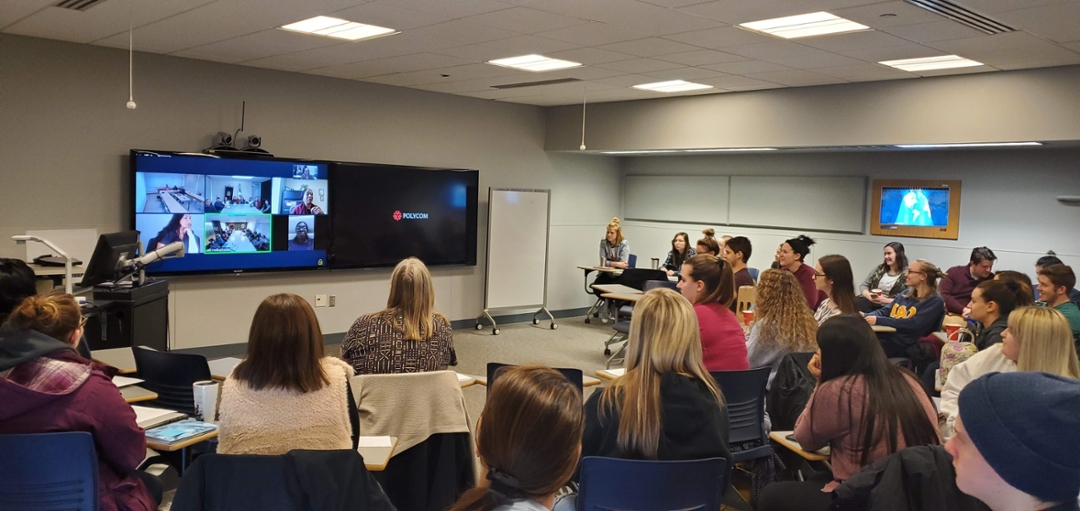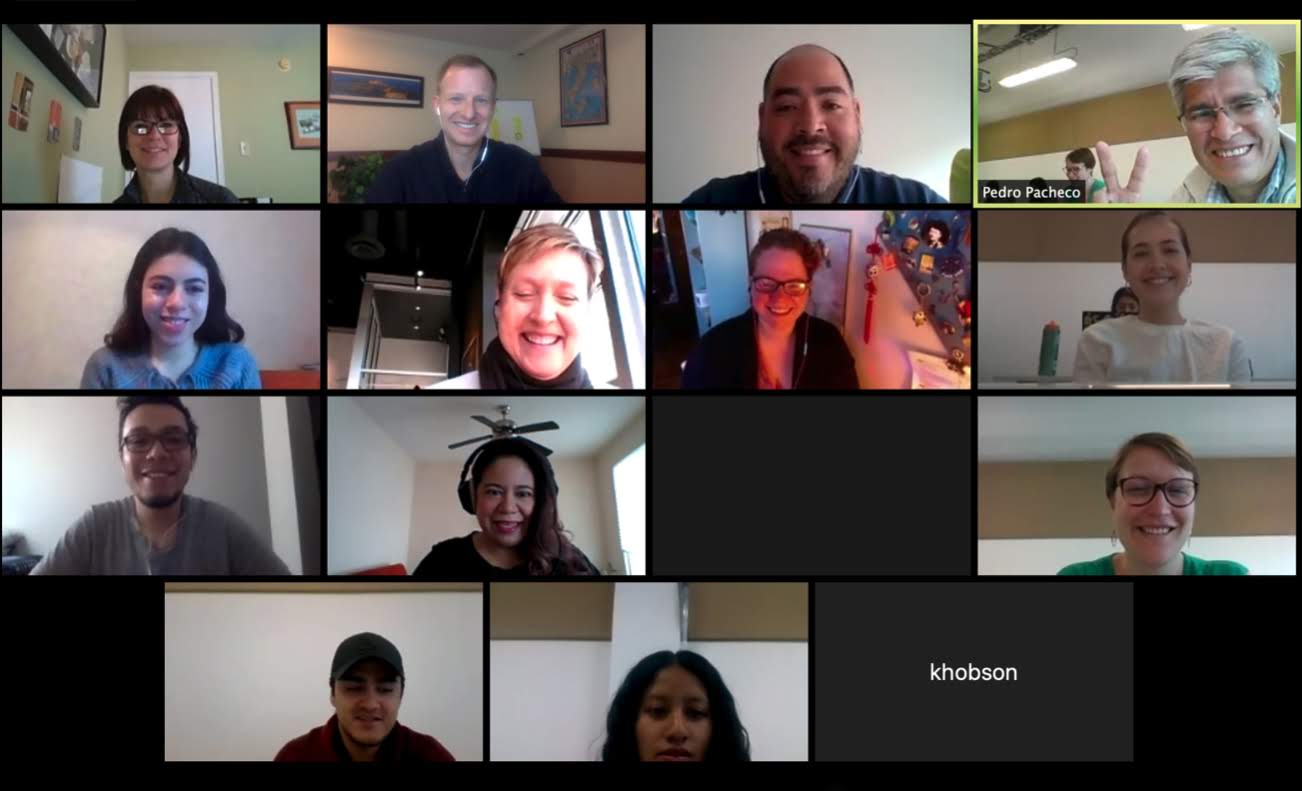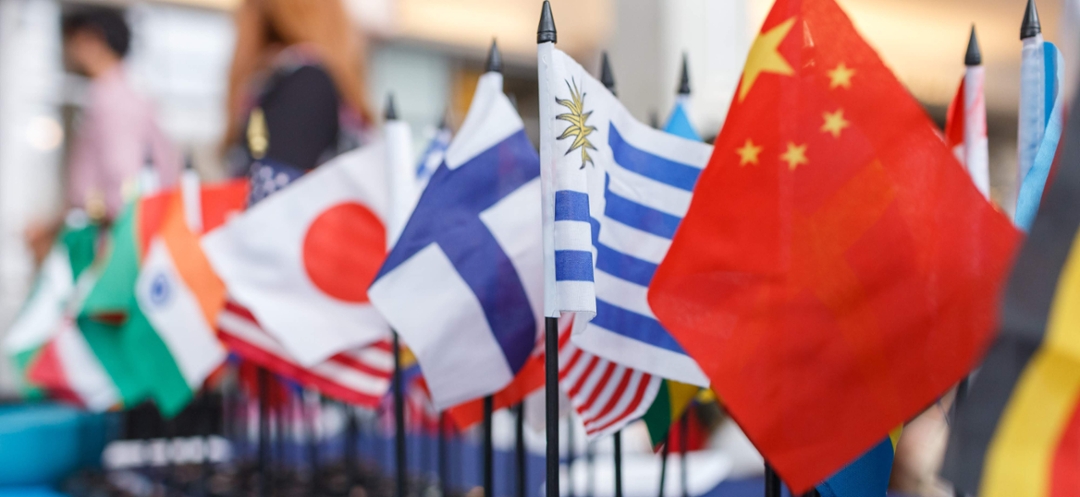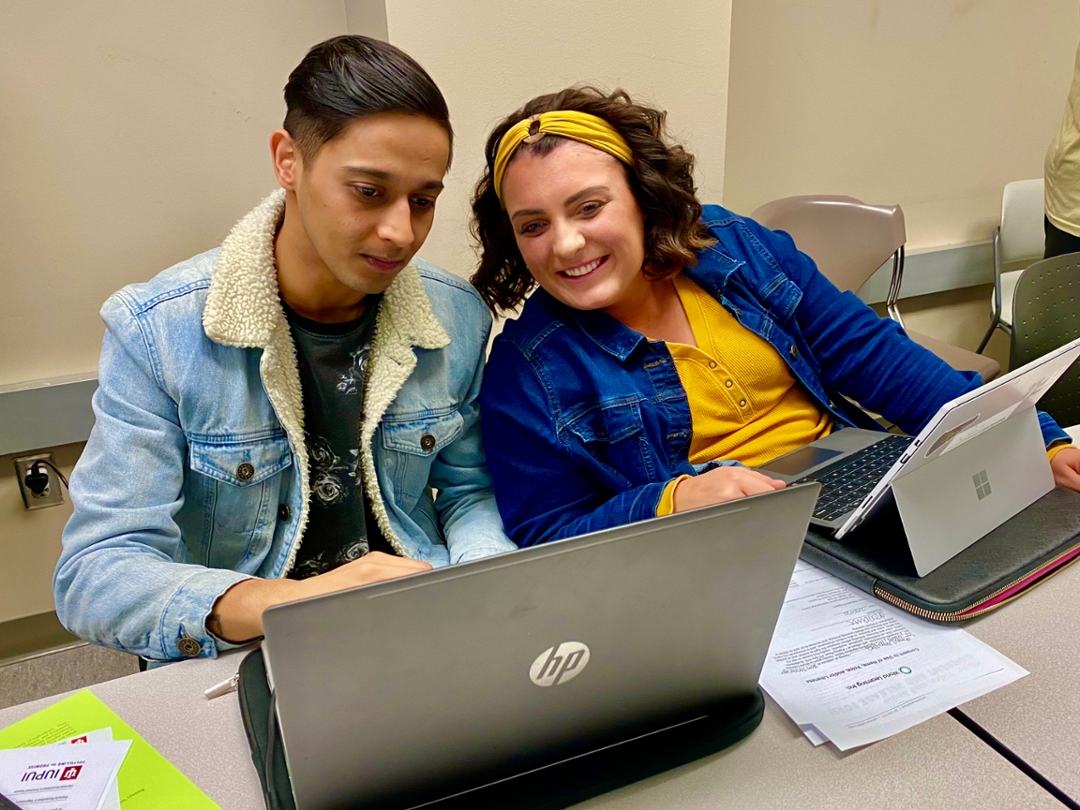Global Learning during COVID-19
Global Learning at IU Indianapolis Continues through Virtual Exchange
With the COVID-19 pandemic altering how universities around the world operate, faculty who are not already accustomed to teaching online are adjusting to new ways of interacting with students, delivering content, and providing high-quality engaged learning. Virtual exchange is one strategy that faculty and student affairs professionals can use to create global learning opportunities for students. Virtual exchange will be an important component of IU Indianapolis reaching the goal of providing global learning experiences for all students. This article highlights the Office of International Affairs’ history in this area, provides an overview of virtual exchange, and shares how three IU Indianapolis schools have recently leveraged virtual exchange to help students develop a global mindset and gain international perspectives in their discipline.
IU Indianapolis’s history with virtual exchange
The Office of International Affairs has been encouraging and supporting the implementation of technology-enhanced global learning for more than two decades. In 2006, IU Indianapolis hosted the Interactive Video for International Education Conference (IVIE). Funded in part through NAFSA: Association of International Educators, IVIE addressed the pedagogical, curricular, and social considerations of using technology to facilitate international education. Since 2016, OIA has encouraged the collaborative strategy called “virtual exchange”, providing professional development in this area, and actively seeking to broker partnerships between IU Indianapolis faculty and staff and counterparts at international institutions. OIA’s Global Crossroads Classroom has been a primary tool in connecting students, faculty, and staff to international peers and colleagues. This video-conferencing enabled facility was one resource that enabled IU Indianapolis to become a recognized leader in comprehensive campus internationalization. In addition to offering the Global Crossroads Classroom, OIA’s positions of director of curriculum internationalization and logistics and technology coordinator have provided guidance and support to faculty who seek to develop a virtual exchange.
What is virtual exchange?
Online intercultural exchange. Global Classroom. COIL. These are some of the terms used in the higher education community to refer to methods and approaches for integrating virtual exchange. Ultimately, they all have transcending borders through technology to facilitate intercultural learning, comparative disciplinary learning, interdisciplinary learning, and global problem solving as goals. Videoconferencing is a tool used to implement synchronous international engagement in and outside of the classroom. Virtual exchange, like curriculum internationalization, can manifest in different levels of complexity. Organizing an international videoconference that happens once or twice a semester can be a rich and valuable activity for facilitating intercultural learning between students during a class session. With an international partner, faculty can also collaboratively design a module or course in which students in different countries use technology (in and outside of class) to work together over time on a shared project that can yield high quality engaged global learning. For virtual exchange to have the highest impact for all involved, the collaborative model implemented over time is most effective.
Technology that can be used to facilitate global learning
Faculty and students can use a variety of free online tools to develop and implement a virtual exchange such as Zoom, Skype, WhatsApp, Slack, Google or other platforms. Social media platforms are also useful and student-friendly tools to facilitate asynchronous collaboration that happens outside of class time and for individual analysis and reflection. Faculty can choose to be an active participant in a group platform, using it to develop community between partner classes as well as prompt, monitor, and evaluate student engagement, or they can request that students engage one-on-one with counterparts on their own schedules. Whatever the approach, it’s important to use tools that are equally accessible for everyone involved.
Recently developed virtual exchange partnerships on campus
IU School of Nursing: A “snowballing” of engagement

Over the past two years, the School of Nursing has been steadily growing an effort to use video-conferencing to enhance student knowledge and abilities in examining the social determinants of health in relation to global health issues. What began as a two-way dialogue, has added a third international partner, and is poised to add two more. The initial partnership was a collaborative effort between IU Indianapolis’s Barbara deRose, Clinical Assistant Professor in the IU School of Nursing, and Maria Begoña Errasti-Ibarrondo, a researcher with the nursing summer school program at University of Navarra in Spain. Based on the course “Managing Illness Across Care Environments,” the two faculty partners jointly decided on the topics and questions that formed the foundation of the dialogue.
When she was an IU student, deRose participated in a multidisciplinary in-person exchange to Mexico. Learning that Indiana University had established a Global Gateway based in Mexico, she was eager to establish an academic relationship with the nursing school at the National Autonomous University of Mexico (UNAM). Not knowing exactly who to partner with, deRose worked closely with the IU Global Gateway in Mexico City, which served as a liaison and introduced deRose to potential faculty collaborators. During this single exchange, students discuss the most prominent health concerns facing the citizens of their country, environmental concerns impacting health, and health services available in their countries via video conference.
The collaboration is poised to further expand as Ukamaka Oruche, Associate Professor and School of Nursing Director of International Programs, has invited faculty from both Moi University in Kenya and Nnmedi Azikiwe University in Nigeria to observe the international dialogue with the intent of incorporating courses from those institutions in Fall 2020.
Herron School of Art+Design: Support from an institutional partner

Early in Spring 2020, a conversation between Bryan Richards, Adjunct Instructor, Herron School of Art + Design, and OIA Director of Curriculum Internationalization Leslie Bozeman led to a virtual exchange collaboration between Richards and IU Indianapolis’s partner institution, Instituto Tecnológico y de Estudios Superiores de Monterrey (Tec de Monterrey) in Mexico. Richards teaches Design Thinking techniques to boost creativity, problem solving, and clarity of communications in the business and social sectors. His Tec de Monterrey partner, Pedro Pacheco-Vázquez, Associate Professor, Department of Architecture, teaches a course that employs similar techniques and has complementary projects to Richards’.
Neither Richards nor Pacheco knew each other before working on this virtual exchange. Bozeman sought assistance from Tec de Monterrey’s Global Classroom Coordinators Gabriela Méndez Carrera and Ricardo Lyle Bañuelos to help identify a partner for Bryan. The Tec de Monterrey team facilitated a series of video calls during which Richards and Pacheco found commonalities in their teaching styles and course goals.
Neither Richards nor Pacheco knew each other before working on this virtual exchange. Bozeman sought assistance from Tec de Monterrey’s Global Classroom Coordinators Gabriela Méndez Carrera and Ricardo Lyle Bañuelos to help identify a partner for Bryan. The Tec de Monterrey team facilitated a series of video calls during which Richards and Pacheco found commonalities in their teaching styles and course goals. From there, Richards and Pacheco quickly established virtual activities for their students, using ideation and visual design skills to enrich daily life among urban residents. A subset of each class and the faculty met outside of their regularly scheduled time, using their own mobile devices to discuss how they would get to know and work with one another. After mutual sharing of cultural information, IU Indianapolis students provided feedback to Tec de Monterrey students on their projects, as the Tec de Monterrey students were further along in implementation.
Richards says, “Ideally, the students from both our cities will get to comment more on each other’s projects, which will lead to more learning for all of us.” Pacheco adds, “This exchange is helping both classes learn new ways to do field research, create prototypes, and build replicable tools to solve problems in the community.” In addition to identifying a partner, the Tec de Monterrey team set up both a website and a collaboration hub through Slack in order to foster dialogue between the classes throughout the duration of their virtual exchange.
School of Engineering and Technology: Working with external organizations
Corinne Renguette, Associate Professor, Department of Technology Leadership and Communication was contacted by World Learning to consider a collaborative partnership on a grant from the Stevens Initiative to bring together university students and young professionals via virtual exchange to create solutions to their countries’ greatest challenges using code.
World Learning was awarded the grant and IU Indianapolis received a sub-contract from World Learning. IU Indianapolis is responsible for curriculum development, recruiting US participants, and running the course, while World Learning provides an organizing framework for the faculty and student participants. This multi-country virtual exchange, called Next Gen Coders Network (NGCN), is structured as a 10-week hackathon that includes instruction on intercultural communication, cross-cultural collaboration, introduction to coding languages, and facilitated project design. It’s open to all IU Indianapolis students from any major.
The project, which was offered as a pilot in Spring 2019, addresses grand challenges in the Middle East and North Africa. Students communicate synchronously and asynchronously to complete a collaborative project. They also complete a pre- and post-course survey about their beliefs, values, and assumptions, and complete reflections during the project to foster their own thinking about these areas. Specifically, IU Indianapolis partners with organizations in Iraq (Speak Now English Center, Volunteer with Us, BiteTech) and the Palestinian Territories (Partners for Sustainable Development, Palestine Polytechnic University, and Save Youth Future Society.) While this virtual exchange is not offered for credit, students gain essential skills in collaboration and work toward high level global learning aimed at a group solution to a challenge.
Several faculty members in the School are involved in this project. Renguette, who has implemented NGCN in her Technical Communication course, serves as IU Indianapolis lead principal investigator. She works with Christian Rogers, Assistant Professor, and Birhan Payli, Visiting Professor, who serve as co-principal investigators. Rob Elliott, Senior Lecturer, who has implemented NGCN in his Global Information Technology course, and Luke Jones, Lecturer, serve as consultants. After the pilot, they collaborated on ideas and made improvements for the full launch which tool place in Spring 2020. Recruitment for Fall 2020 is under way and anyone can apply.
For faculty and staff interested in integrating international virtual exchange into a course or student development program, the Office of International Affairs will provide information and professional development. Lin Zheng, Clinical Associate Professor, Kelley School of Business, along with Rob Elliot, is establishing a faculty and staff community of practice on virtual exchange. For more on these opportunities, please contact Leslie Bozeman, Director of Curriculum Internationalization, at lbozeman@iu.edu.
To see more examples of how IU Indianapolis faculty are incorporating virtual exchange and other curriculum internationalization strategies check out the IU Indianapolis Curriculum Internationalization Profiles, and consider incorporating one or more IU Indianapolis’s new Dimensions of Global Learning into your course.
For an example of a virtual exchange program focused on the SDGs, see the following highlighted exchange between IU Indianapolis and the University of Rwanda.
References
Collaborative On-line International Learning
7/28/20: Page updated to reflect that NAFSA, not the Department of State, funded the IVIE.


